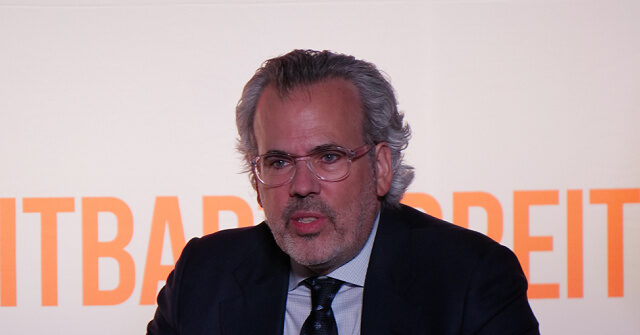T1 Energy CEO Daniel Barcelo highlighted the challenges facing the U.S. solar industry in competing with China, particularly in areas like polysilicon, while expressing confidence that America can be cost-competitive by strengthening domestic manufacturing.
Speaking at a Breitbart News policy event with Washington Bureau Chief Matthew Boyle, Barcelo explained that one area where it is still difficult to compete with China is polysilicon, citing the pricing advantage of Chinese polysilicon as creating “a very large disadvantage to the foundation of a robust solar industry.”
While he noted that “the U.S. solar industry is very robust,” he emphasized that America can be extremely competitive in the conversion process — from silicon to silicon cell — because it relies on power, natural gas, water, and specialty gases, all areas where the U.S. has strengths.
“This is polysilicon pricing advantage that comes from Chinese polysilicon, I believe, creates a very large disadvantage to the foundation of a robust solar industry,” Barcelo stated. He affirmed that T1 Energy has “made public comments in support of section 232, for higher tariffs on polysilicon, especially Chinese source polysilicon,” signaling support for trade measures to curb China’s edge in that segment.
Barcelo, who shared he has “worked globally in oil and gas,” pointed to U.S. growth in those energy sectors as a model. “America used to be not the largest oil producer. Now it is 14 million barrels a day versus Saudi. Natural gas: America is larger than Russia. I don’t see any reason why solar doesn’t all start leading, but there’s a lot of catch-up to do with China,” he said.
Despite the existing gap, Barcelo expressed confidence in the American energy sector’s potential to close it. He explained that the conversion process from raw silicon to finished solar cells relies heavily on resources where the U.S. is competitive. “That conversion is power, that conversion is natural gas, that conversion is water, that conversion is specialty gases. All those things are things that America can be extremely competitive on,” he stated.
Barcelo also addressed the broader manufacturing landscape, attributing some of the current lag to strategic choices. “America just hasn’t had the manufacturing. And part of that is we’ve just chosen to manufacture in other countries, and we buy it,” he remarked. He expressed confidence that the U.S. can still compete globally, stating, “We can be competitive on costs and pricing.”
Barcelo asserted that while China currently holds advantages in key areas like polysilicon, the United States is capable of competing on cost in other parts of the solar supply chain. “On the other parts, bring it on,” he added. “You’re always competing to be the lowest cost … and I think America can be very low cost.”
Read the full article here


